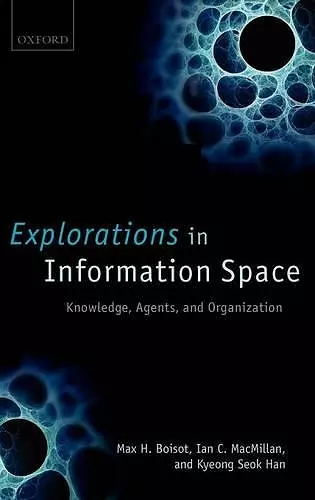Explorations in Information Space
Knowledge, Agents, and Organization
Ian C Macmillan author Max H Boisot author Kyeong Seok Han author
Format:Hardback
Publisher:Oxford University Press
Published:27th Dec '07
Currently unavailable, and unfortunately no date known when it will be back

With the rise of the knowledge economy, the knowledge content of goods and services is going up just as their material content is declining. Economic value is increasingly seen to reside in the former - that is, in intangible assets - rather than in the latter. Yet we keep wanting to turn knowledge back into something tangible, something with definite boundaries which can be measured, manipulated, appropriated, and traded. In short, we want to reify knowledge. Scholars have been debating the nature of knowledge since the time of Plato. Many new insights have been gained from these debates, but little theoretical consensus has been achieved. Through six thematically linked chapters, the book articulates the theoretical approach to the production and distribution of knowledge that underpins Max Boisot's conceptual framework, the Information Space or I-Space. In this way the book looks to provide theoretical and practical underpinnings to Boisot's book Knowledge Assets (OUP, 1998). Following an introductory chapter, how knowledge relates to data and information is first examined in chapter 1, and how different economic actors - entrepreneurs, managers, etc - use knowledge as a basis for action is explored in chapter 2. Chapter 3 looks at how the heterogeneity of economic actors arises naturally from their respective data processing strategies in spite of any similarities in the data that they might share. Chapter 4 argues, contra much transaction-based economics, that an organizational order must have preceded a market order, something that should be reflected in any knowledge-based theory of the firm. Chapter 5 discusses the cultural and institutional significance of different kinds of knowledge flows. Finally, chapter 6 presents an agent-based simulation model, SimISpace, that illustrates how the I-Space might be applied to concrete problems such those of intellectual property rights. A concluding chapter proposes a research agenda based on the theorizing developed in the book. The approach the book sets out is used by a whole range of organizations to issues of knowledge management, policy, economics, and organizational and cultural change.
In a beautifully written collection of essays, Max Boisot develops his thinking on the intertwined concepts of space, time and knowledge. He is one of those rare authors who can speak lucidly and authoritatively across disciplinary boundaries. His prose compels our attention and the content is far-reaching. Knowledge is more than mere information or data and all human societies have relied on its development. Nevertheless, recognizing the increasing importance of knowledge in modern economies, Boisot develops a challenging theoretical framework that provides invaluable insights about the world in which we live. * Geoff Hodgson, Research Professor in Business Studies at the University of Hertfordshire *
ISBN: 9780199250875
Dimensions: 242mm x 162mm x 20mm
Weight: 508g
242 pages